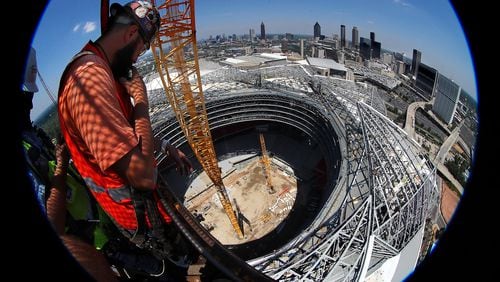Georgia’s economy added 5,600 jobs last month, providing an upbeat but unspectacular ending to year of modest growth across most employment sectors.
In 2017, the state finished the year with 83,200 more jobs than the year before, according to a report Thursday from Georgia’s Labor Department .
“As we look back at the year, it was impressive,” Labor Commissioner Mark Butler said. “Over the year, every major measurement improved considerably.”
The expansion is expected to continue this year and is currently the third-longest since World War II. But just because it’s gone on for a while doesn’t mean it’s about to come to an end — economists are fond of saying that expansions do not die of old age.
“Expansions don’t get killed that easily,” said Rajeev Dhawan, director of the Economic Forecasting Center at Georgia State University. “You have to have a precipitating event.”
In 2007, recession was sparked by over-building of housing and a financial crisis. In 2001, it was collapse of the tech bubble. Other downturns have been triggered by high interest rates or soaring oil prices.
Still, the pace of the hiring last year was the slowest of the past five years. The deceleration will continue, Dhawan said. He predicted a gain of 70,400 jobs this year and 65,500 jobs in 2019.
Hiring trends show strength in higher-paying jobs and in lower-paying jobs, but much less hiring in the middle for decent-paying blue collar positions.
The strongest hiring came in the corporate sector, where pay is relatively high. But the next two strongest sectors were leisure and hospitality, where pay is typically low, and education and health services, which is a mix that includes many low-paying jobs.
Manufacturing – once a good-paying steppingstone to the middle class – saw a decline during the year, the Labor Department said.
Hiring in construction, which had boomed when thousands of workers were needed for two massive sports stadiums and a series of high rises, was much slower last year.
And while the number of new claims for jobless benefits was well below a year ago in December, the unemployment rate ticked up to 4.4 percent from 4.3 percent in November. Still, joblessness was down for the year – as it has been every year since 2010.
About 113,000 more people entered the Georgia labor force, a sign of a growing economy.
Some 225,000 people are out of work and looking for a job, the state said. More troubling, nearly one third of them – 67,500 workers – have been in the job-hunt for more than six months.
Georgia job growth by calendar year
2017, 83,200
2016, 115,000
2015, 112,100
2014, 137,900
2013, 89,700
2012, 64,500
2011, 39,200
Source: Georgia Department of Labor, Bureau of Labor Statistics
Also by Michael E. Kanell: Storm hurts some workers
MYAJC.COM: REAL JOURNALISM. REAL LOCAL IMPACT.
AJC Business reporter Michael E. Kanell keeps you updated on the latest news about jobs, housing and consumer issues in metro Atlanta and beyond. You'll find more on myAJC.com, including these stories:
Never miss a minute of what's happening in local business news. Subscribe to myAJC.com.
About the Author







